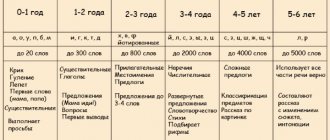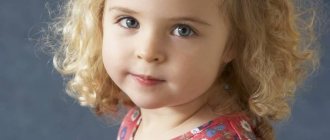The development of a child’s speech is an important area of preschool and school education. And one of the criteria for success is a rich vocabulary (the number of words that a child can use during communication).
To avoid delayed speech development, it is necessary to enrich the baby’s vocabulary from the first year of life. Classes aimed at expanding and activating the vocabulary should be conducted not occasionally, but daily. Only with regular and systematic vocabulary work will you be able to raise an erudite and intellectually developed child.
How do the first words come about?
Every mother eagerly awaits her baby's first words. As a rule, all relatives are involved in the waiting process: mom, dad or grandma - which word will come first? Usually, the winner in this fight is the one who most often stands over the child’s crib, looks carefully into his eyes and clearly repeats: “pa-pa” or “ma-ma.” As a result, the child pronounces the cherished word, and the whole family celebrates the historical event! The child is bathed in applause, and he, satisfied, continues to babble the magical sounds that have caused so many positive emotions in adults. If you continue in the same spirit - look into the child’s eyes, clearly pronounce new words and just as emotionally rejoice at each new one - you will certainly be surprised at the dynamics of your baby’s speech development.
“Why exactly “dad”, “mom” and “baba”? The sounds that make up these words are classified as labiolabial and labiodental. They are formed with the help of lips and voice and are easiest for a child. In order for the baby to also easily develop front-lingual, mid-lingual and back-lingual sounds, add the “horse” exercise: click happily with him,” explains Olga Ivanova.
Vocabulary composition of the language
VOCABULARY COMPOSITION OF A LANGUAGE - a set of words of a language, the same as vocabulary.
Vocabulary is the most flexible language level. Changes and improvements in the vocabulary of a language are directly related to human production activities, to the economic, social, and political life of the people. The vocabulary reflects all processes of the historical development of society. With the advent of new objects and phenomena, new concepts arise, and with them words to name these concepts. For example, after 1917, the words soviets, collective farm, state farm, middle peasant, Sovnarkom, educational program, Chonovets, etc. entered the Russian language. At different times, they left the language. With the death of certain phenomena, the words that name them go out of active use or change their sound appearance and meaning, for example: thief - 'thief, robber'; guest - 'trader, merchant - mostly foreign'; apple of the eye - 'pupil of the eye'; Komsomol member - 'member of a Komsomol organization', etc.
Freeing the dictionary from unnecessary words (and only those “fall out” from it) is just as natural and necessary as enriching it with new words: it allows speakers of a given language to get rid of unnecessary lexical doublets, eliminate outdated ones from their active vocabulary, and thereby contributes to the more effective performance by language of its main and most important function - to be a means of human communication.
Since the consolidation of new words and meanings in a language, and especially the departure from an obsolete language, is a gradual and lengthy process, in the vocabulary of the language as a whole there are simultaneously two layers of words, see: ACTIVE VOCARIARY and PASSIVE VICTORIARY.
See: VOCABULARY
What is active and passive vocabulary?
All the words that a child knows are his vocabulary (lexicon). Moreover, those words that the baby understands, but does not pronounce himself, belong to the passive dictionary. And those words and phrases that are constantly used in everyday speech are included in the active one.
Olga Ivanova: “For example, if you ask a one-year-old child “where is the cat?” and he points to the pet or the corresponding picture with his finger, which means the word “cat” is already in his passive dictionary. When he independently says “cat”, or “koska”, or any other sound that means a cat for a child, we can say that the word has become an active lexicon.”
It is worth noting that the passive vocabulary is always larger than the active one, even in an adult.
After all, each of us knows what society, quantum, molecule are, yet we almost never use these words in everyday speech.
Observation with comments
From the very birth of the baby, start talking to him: the baby must get used to the sound of human speech. Lesson options:
- While walking, tell your baby everything you see. Try to make the story picturesque and figurative: use many adjectives, use synonyms. An example of a good description: “This is a tree. It is green, bright, with lush foliage. And how big, tall and majestic it is! This is a truly gigantic tree!” Try to comment on events emotionally: say how you feel from contemplating a rainbow or how you feel when a hot object touches your hand.
- An eight-month-old child can already be taught about the structure of the body. Touch it and say: “This is a pen, your pen; little pink hand." Then show your hand and say: “This is my hand: look how big it is.” Remember to use as many adjectives as possible.
- Organize a joint observation of something: a pet, an insect, a tree swaying in the wind, or something happening on the street. At the same time, comment on what is happening: “Look, a grasshopper is crawling along a leaf. Now he moved his paw. Funny, isn't it? Oh, that’s it, he galloped away.” If possible, let your child touch, smell, or even lick the observed object.
- You can conduct several experiments with your child. Bring his hand to the cat’s fur and say: “This is a cat; It’s soft, warm and smooth.” Then invite the baby to hold a piece of ice and say: “This is cold, hard and wet ice.”
- From the age of 2, you can purposefully introduce new lexical units into your child’s vocabulary. To do this, you must demonstrate the object to the child, say its name several times and make sure that the baby remembers it. Try to do it naturally. On a walk, as if by the way, show him a tree and say: “This is a spruce.” Point to another spruce and say again: “And this is a spruce.” Then, pointing to the tree, ask: “Do you think this is a spruce?” To make sure that your child remembers the word, point to the spruce and ask: “What kind of tree is this?”
How to calculate the volume of active and passive vocabulary?
Finding out the approximate number of words in a passive dictionary is easy. It is enough to ask the child to show a certain object, action, object (for example, a cat). If the child did everything correctly, then the word is counted in the passive dictionary.
Now let’s calculate the size of the active dictionary. What should you consider?
- Words that the child pronounces clearly: “give”, “mom”, “dad”.
- Onomatopoeia for animals and objects: car “beep-beep”, dog “woof-woof”.
- Reproduction of incomplete words: “baka” - dog.
- Words that are pronounced incorrectly, but the number of syllables and stress are correct: “patina” - machine.
- Words that are pronounced the same, but have different meanings (this is the norm up to 2.5 years): “ma” - mom, car, meow (each word is counted separately).
“To make it easier to count active vocabulary and clearly see the progress and dynamics of a child’s development, you need to keep a diary of speech development. Every month you can enter the words that your child has mastered. From 2.5-3 years old, keeping track of every word will be quite difficult due to the growing talkativeness. Then you can write down the baby’s funny sayings in your diary, which you will be happy to re-read in the future,” the speech therapist advises.
Literature
1. Ivantsova E.V. Lingvopersonology: Fundamentals of the theory of linguistic personality: textbook. Benefit. Tomsk: Publishing house Tom. Univ., 2010. 160 p.
2. Karaulov Yu.N. Russian language and linguistic personality. M.: Editorial URSS, 2002. 264 p.
3. Lvov R.M. The emergence and development of speech in a child. Factors of human speech development. Periodization of human speech development: Preschool age. School age // L.L. Kasatkin, L.P. Krysin, M.R. Lvov and others. Russian language. M., 1989. pp. 31–32.
4. Lvov R.M. Speech of secondary school students // Dictionary-reference book on Russian language methods. M.: ROST SKRIN, 1997. pp. 185–186.
5. Timofeev V.P. Personality and linguistic environment. Shadrinsk, 1971. 121 p.
6. Chulkina N.L. Idiolexicon of a creative personality and the lexicon of a typical native speaker: the principle of structure, reconstruction and description // Peoples' Friendship University of Russia. M., 1996.
How many words should a child have in his active vocabulary?
The norms for the formation of the active vocabulary of a child of preschool and primary school age are as follows:
Thus, if a child normally pronounces no more than 10 words per year, then a child’s vocabulary at 3 years old is already about 1000 words. The vocabulary of a 5-year-old child is already about 2000 words, and the vocabulary of a 6-year-old child is about 3500 words. Don't panic if you suddenly find that your child is speaking fewer words than normal. Each child is individual and develops at his own pace. There are children who begin to speak closer to 2 years, but understand everything already at 1-1.5 years.
If you still have doubts or questions about your baby’s development, for your own peace of mind, consult a specialist. Good dynamics are provided by the inclusion of fun games to develop vocabulary, as well as finger exercises and palm massage. Positive emotions play a very important role: going to the zoo, water park and spending creative time together with parents.
Conversations
From the age of 3, the child already understands the meaning of the text and understands the content of poems and fairy tales that his mother reads to him. Therefore, you can discuss the books you read or the illustrations you viewed. Effective exercises:
- the child tells what is shown in the pictures and makes up stories based on them;
- the child answers questions based on the text he just listened to (good questions: who did you like best? what event do you remember? what would you do in the hero’s place? why?);
- the child describes an object in detail (parents can ask clarifying questions: what shape is it? what color?).
To learn the names of body parts and items of clothing, have your child describe himself or a doll.
Reading fiction
Be sure to read aloud to your child. After all, reading fiction is the most important way to enrich your vocabulary. Children who have loved books since childhood have more developed speech than their peers, are able to construct sentences correctly, and write essays better in school.
When reading a book to your child, try to pronounce words clearly, loudly and correctly, and avoid mistakes in articulation and emphasis. If there are unfamiliar words in the text, explain their meaning to the baby.
Where can I get new words?
This, of course, is communication with parents and other close adults, and then added communication with other children. Interesting games and activities are also important - by expanding our horizons, we expand our vocabulary. What does it mean? At a very young age, every new sensation is recorded by a newly created neural connection in the baby's brain. Over time, everything that he has already learned and will snatch from the world around him in large quantities will begin to be reflected in words. Family traditions and holidays, walks and fairy tales.
“Everything around can become a source of enrichment for a growing person’s vocabulary. The main condition here is that the parent explains, names and shows. And in the future, he answered numerous questions,” explains Olga.
New sensations
Firstly, everything is tactile. Finger paints and various surfaces. Pet fur and rough tongues, sea and sand, pebbles and acorns, spruce branches and food. Plasticine and constructor. This is an inexhaustible source. And also sounds, smells and everything, everything, everything: music and new songs, for example, lullabies. The tastes of food and the smells of flowers - all this gives rise to new connections, new thoughts and requires words, stimulating the child.
Books, stories and games
Parents who read fairy tales and poems, invent nursery rhymes and sing songs are very helpful parents. Enthusiastic grandmothers, aunts, and older brothers and sisters also get involved. It is advisable to choose poems that are age-appropriate, and books with bright and clear pictures.
Travel and dating
Even if the baby just looks at everything and gurgles, new places and people will still awaken the dormant spirit of the explorer in him. The main thing on such trips is to tell and show the child everything, to let them touch what is interesting. And don’t be upset if a brick fence arouses more enthusiasm than a local landmark.
Brothers and sisters
In a large family, younger children usually speak better and start talking earlier because they often interact with older brothers and sisters.
Emotions
Find something that your child likes. A dog, a kettle and a slow cooker with lights, a pair of mom’s rubber boots - if a person is delighted, then you’re doing everything right. And it’s not far from the storm of emotions to its verbal expression.
Educational games
A child’s knowledge of the world occurs through games. How can you expand your vocabulary through games?
- "Edible-inedible." Game for children from 3 years old. The presenter (or mother) throws the ball to the child and names the object. If it can be eaten, the baby catches the ball; if the object is inedible, there is no need to catch the ball. You can change the conditions of the game, for example, the participant must catch the ball if the leader calls something soft.
- "Who is bigger". A good game that you can play, for example, in line or on the way to kindergarten. We come up with a category of words, for example, pets. We name domestic animals in turn: dog, cat, cockerel, chicken, cow, etc. The one who remembers the most pets wins. By the way, in this game the mother can give in a little so that the baby feels like a real winner.
- "Children's crocodile." The child chooses some thing or toy, but does not tell the other participants what he chose. Then the baby must describe the chosen item in words, but cannot name it. Then the players change places.
- “Selecting antonyms.” You tell the child a word, and he must choose an antonym: night-day, sun-moon, heaven-earth, evil-good, crying-laughing, etc.
- "Fact or fiction?" You offer your child fictitious or real statements, and his task is to agree with you or find errors. For example, a dog is bigger than an elephant, chickens eat semolina, a dog loves a bone, etc.
The task of parents is to help their son or daughter develop competent, rich speech. To do this, you need to constantly talk with the child, expand his vocabulary, read books, and offer educational games. The more you work with your child on speech development, the easier it will be for him to learn, work and express his thoughts in the future.
Is learning languages good for speech?
Early learning of languages helps the development of a child’s speech if this process brings joy to parents and the baby. Therefore, you need to switch to the foreign language that you like best and know best.
Bilingual children begin to speak earlier from birth if both parents actively communicate with them.
“I often compare learning a second language to learning to swim,” Olga explains. If a child begins to master this activity at 3–4 months, then by the age of three he will already be able to swim perfectly independently. Then you can start teaching him how to ski, say. And if you start swimming at the age of three, then, of course, this process will take much longer, and parallel training in different sports can cause certain difficulties. It’s the same with languages.”
Balance of active and passive vocabulary, or why develop speech?
A passive dictionary will always be larger in volume than an active one. At the same time, we should strive to achieve a balance between dictionaries, that is, try to use as many words as possible that we know in everyday speech. And teach this to our children. For what?
In modern society, people who can speak well and interestingly, with developed oratory skills, are valued. The ability to express one’s thoughts clearly and beautifully, captivate the audience, and win the interlocutor to one’s side will help the child in school, in communicating with peers, and throughout life. In addition, an increase in vocabulary entails the development of intelligence, memory, attention, imagination and perception.
A child with a rich vocabulary communicates more easily with adults and other children, and accordingly, adapts better in society. It is easier for such children to learn poetry, solve logical problems, create, and, in general, realize themselves.
What to do if the child does not speak? Read about the signs that should alert parents.
Share your story: when did your child start talking and what was his first word?
- share with your friends!
Experts: Olga Ivanova
Describe, reason, speak!
You can describe both the surrounding reality and works of art. For example, ask your child to tell you what is drawn in a famous painting or talk about the meaning of a movie you recently watched. It is useful to play educational games with children. Here are some of them:
- “Guess what it is?”: the parent describes a phenomenon or object to the child without using its name. The child's task is to guess what the parent is describing. Then you need to switch roles.
- “Let’s make up a fairy tale”: the adult begins to tell the story, and the child continues.
- “Adjective plus noun”: the adult names the adjective, and the child names the noun that goes with it. It would be interesting if points would be awarded for each word - the more unusual and beautiful the phrase, the more points.
- “I Know Five”: the parent sets a topic (for example, animals), the child’s task is to name five words in this topic in a short time.
Pupils of the Children's and other television projects perform in charity concerts.
Your children can do this too! In the disciplines “Integrated Development”, “Early Development”, “Acting for Children” they will develop the talent of a storyteller, master the techniques of effective communication and enrich their speech with beautiful turns of phrase and new words. Come to us!









